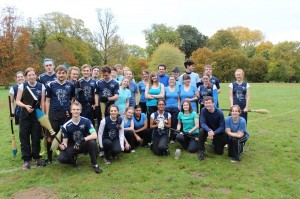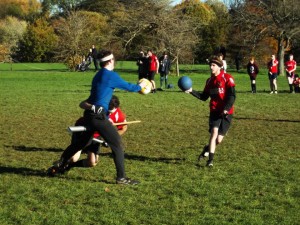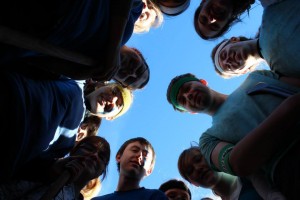“Brooms up!” says the referee, and we all sprint for the center of the field. It’s a race for the four balls, chasers running for the Quaffle (an under inflated volleyball) and Beaters for the three bludgers (dodgeballs). There’s mud in my face so I can’t really see, but I charge ahead enthusiastically and slam into the girl who picks up the Quaffle. Then I take it and run the other way, until a beater whacks me in the back of the head with a dodgeball and I relinquish control.
I did not expect to join a Quidditch team when I came to Oxford, but in retrospect it makes sense because Quidditch and Oxford are conceptually equidistant to Harry Potter. In fact, Middlebury College was the first school to play Quidditch as an actual game with regulated rules, but the UK did not take long to catch up. One afternoon early in the term, out for a stroll in the University Parks, I see some guys setting up the metal goal hoops. Five minutes later I’m playing, and two weeks after that I’m on a team preparing for an international tournament.
“Where’s the point chaser?” yells our captain, surveying chaos on the field. “Beaters, you need to play defensively!” Two beaters are engaged in a personal battle, trying to face-beat one another. No one notices that the snitch has been released and escaped into the trees. Chasers dip and dodge, tackling each other for Quaffle control. I run madly for the back of the field, trying not to impale myself on anyone’s broom while also keeping hold of mine. And then, suddenly and for reasons I do not understand, I have the ball. Cursing myself for not bringing cleats, I scramble for the other side of the pitch. A bludger comes my way and I block it, wham! Someone tries to tackle and I dodge, haha! Then I trip and slide in the mud and the other team gets the ball.
I am not a born athlete. Sure, I can run for a (very) little while, but propose anything more intense than a game of pickup ultimate and I’m the first casualty. What a delight then to discover a game where everyone protests fitness drills. It’s a group bonding ritual–argue hard over the drills and then play as a united front. Heck, not only does this team contain me (I admit to resenting organized sports since a young age) but also a kid with a metal spine, a girl who says she hasn’t played sports in three years, and even several asthmatics. We’re in business!
What I have not told you is that we are the JV team. The varsity group is actually quite fit. But I quickly discover that even our nontraditional group of players can still tackle hard enough to knock a big boy down (one of the tiny girls knows kung-fu, it turns out), and score points when it counts.
It’s two minutes until the end of the match and my team is down twenty points. Gaining speed, I smack into the guy with the Quaffle and refuse to let go. (Might I mention that this guy is known as Bone Cruncher for a notorious moment in a previous tournament.) Annoyed, he shakes me back and forth, but I won’t budge. Finally he passes the Quaffle off and a tiny girl that no one even realized was playing grabs the ball and scores for my team. Hurrah!
“Good game, everyone,” says our captain as we toss our brooms into a pile next to the pitch. Nearby, one of the senior players attends to a boy who experienced a broom handle to the face. “I think we’re ready for the tournament. Now who wants to help me put away the hoops?”
Participating in Quidditch is important to me because solitary study is a norm at Oxford. I simply don’t go to class, or interact with many people during my work time. To illustrate this point, imagine that you are in a lab class at CC–you will most likely have at least five contact hours with your professor and other students during one weekday. By contrast, I would spend all of those hours (as well as the additional CC “homework” hours) studying by myself in a library, without a professor or any other students. It’s gratifying to know that I can learn without direct instruction, but the experience of studying with only books for company (especially in a castle basement) can be isolating. So it’s good to have the Quidditch pitch to look forward to in the evenings.
It’s the last game of the night now, and the snitch is on the pitch with seekers in hot pursuit. I grab the Quaffle and run through two opposing chasers. I’m clear! The hoops are ahead, singing welcoming happy melodies. At the crucial moment someone clamps down on me from behind, but I won’t stop. I reach the goals and toss the ball through. Turning to accept a victorious cheer from my team, I realize that the game has already ended ten seconds before when the snitch was caught my my team’s seeker. Ah well–I might not be a perfect player, but at least I’m a member of the team.
ps Here are some photos from the first ever British Quidditch Cup, at which Oxford hosted 16 teams from around the UK.



Jake-
Another very entertaining post! Who knew you had such I sports writing talent!? Interesting comparison between study time use at Oxford vs. CC. I’m wondering how that difference affects someone’s life/work/career later. You, however, will have the benefit of both experiences. CC misses you; TWIT misses you. But what a wonderful experience you are having! Thanks again for sharing.
Your description of the game sounds much like a session of the House Of Commons.
I love your posts jake! You are such a great writer and it is a treat to read.
very interesting!
Sounds so fun! Enjoy Enjoy! And send/post a bunch of photos!
I was born in Cambridge , so I’m kinda a Brit. and I imagine your rival!!
Love ya kiddo.
Jake – We should have suspected that you were always a perfect athlete – just waiting for a sport worthy of your talent. There has never been anything ordinary about you – so why would you have ever settled for anything less than the magic of Quidditch?! You are indeed a wonderful writer. Thanks for giving me a colorful sports story to share when I get tired of people talking about the Superbowl or NBA finals.
Jake – such a great description of your team and the game!!! I’m so sorry I can’t be there to watch you all play. Enjoy!